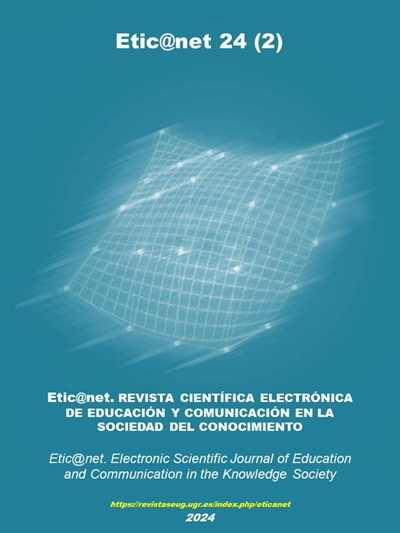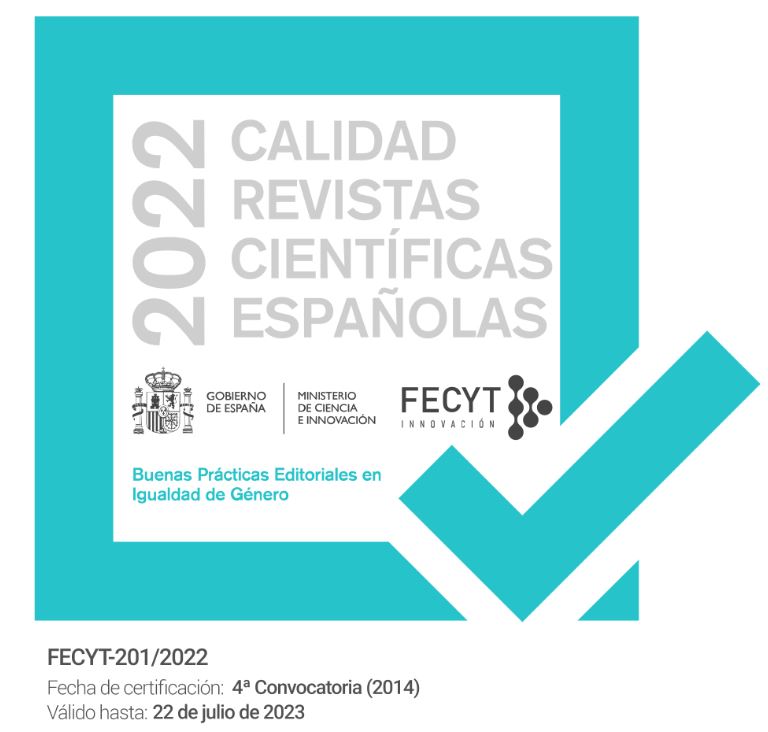ChatGPT: A new tool for learning? Perceptions and Usage Among College Students
DOI:
https://doi.org/10.30827/eticanet.v24i2.31026Keywords:
ChatGPT, OpenIA, Inteligencia Artificial en Contextos Educativos, Cuestiones Éticas en la IAAbstract
This study explores the usage and adoption of the ChatGPT tool among university students from a higher education institution in Mexico City. It focuses on the frequency, quality of information, and potential perceived benefits for education among students. The research employs an exploratory quantitative approach, with a sample of 151 students aged 17 to 24. For data collection, a questionnaire was utilized in October 2023. The results indicate that 88.1% of respondents are familiar with ChatGPT, and 69% use it for academic tasks. Overall, the quality and diversity of information provided by the artificial intelligence tool were positively perceived by students, but there is a sense of caution regarding the tool's reliability, source reliability, and user privacy and security. The study underscores the need for future research to focus on the ethical implications of artificial intelligence in education.
Downloads
References
Arthur, P. (2023, December 21). Using proprietary language models in academic research requires explicit justification. https://www.nature.com/articles/s43588-023-00585-1
Bécares, B. (14 de abril de 2024). El MIT quería comprobar si de verdad ChatGPT mejora nuestra productividad. Los resultados de sus pruebas son muy claros. Genbeta.
Brown, T. B., Mann, B., Ryder, N., Subbiah, M., Kaplan, J., Dhariwal, P., y Amodei, D. (2020). Language models are few-shot learners. arXiv. Recuperado de: https://arxiv.org/abs/2005.14165
Castells, M. (25 de febrero de 2023). ChatGPT. La Vanguardia. Recuperado de: https://www.lavanguardia.com/opinion/20230225/8782438/chatgpt.html
Fajardo Aguilar, G. M., Ayala Gavilanes , D. C., Arroba Freire , E. M., & López Quincha , M. (2023). Inteligencia Artificial y la Educación Universitaria: Una revisión sistemática. Magazine De Las Ciencias: Revista De Investigación E Innovación, 8(1), 109–131. https://doi.org/10.33262/rmc.v8i1.2935
Firaina, R., & Sulisworo, D. (2023). Exploring the Usage of ChatGPT in Higher Education: Frequency and Impact on Productivity. Bulletin Edukasi Indonesia, 2(01), 39–46. https://doi.org/10.56741/bei.v2i01.310
Fitria, T. N. (2023). Artificial intelligence (AI) technology in OpenAI ChatGPT application: A review of ChatGPT in writing English essay. ELT Forum: Journal of English Language Teaching, 12(1), 44-58. https://doi.org/10.15294/elt.v12i1.64069
Forbes Staff (8 de marzo de 2023). Chomsky alaba avances en IA, pero advierte de sus peligros y su ‘amoralidad’. Forbes. Recuperado de: https://www.forbes.com.mx/chomsky-alaba-avances-en-ia-pero-advierte-de-sus-peligros-y-su-amoralidad/
Galli, M.G. y Kanobel, M. C. (2023). ChatGPT en Educación Superior: explorando sus potencialidades y sus limitaciones. Revista Educación Superior y Sociedad, 35 (2), 174-195. Doi: 10.54674/ess.v34i2.815
García-Peñalvo, F. J. (2023). La percepción de la Inteligencia Artificial en contextos educativos tras el lanzamiento de ChatGPT: disrupción o pánico. Education in the Knowledge Society (EKS), 24, e31279. https://doi.org/10.14201/eks.31279
Gao, R., Merzdorf, H E., Anwar, S., Hipwell, M C., & Srinivasa, A R. (2024). Automatic assessment of text-based responses in post-secondary education: A systematic review. Computers and Education: Artificial Intelligence 6. https://doi.org/10.1016/j.caeai.2024.100206
Gao, X., & Wang, D. (2023). Quantifying the Benefit of Artificial Intelligence for Scientific Research. Cornell University. https://doi.org/10.48550/arxiv.2304.10578
Hernández Rizzardini, R., Amado-Salvatierra, H. R., & Morales Chan, M. (2021). Integrating a conversational pedagogical agent into the instructional activities of a Massive Open Online Course. In S. Caballé, S. N. Demetriadis, E. Gómez-Sánchez, P. M. Papadopoulos, & A. Weinberger (Eds.), Intelligent Systems and Learning Data Analytics in Online Education (pp. 31-45). Academic Press. ISBN 9780128234105. https://doi.org/10.1016/B978-0-12-823410-5.00005-X.
Jones, L. (2024, March 21). The opportunities and risks of large language models in mental health. Cornell University. https://arxiv.org/abs/2403.14814
Karan, P S R I. (2024, March 18). A Toolbox for Surfacing Health Equity Harms and Biases in Large Language Models. Cornell University. https://arxiv.org/abs/2403.12025
Kashish, M. (2024, January 28). Comuniqa: Exploring Large Language Models for improving speaking skills. Cornell University. https://arxiv.org/abs/2401.15595
Kevin, R, M K. (2023, November 2). Human participants in AI research: Ethics and transparency in practice. Cornell University. https://arxiv.org/abs/2311.01254
Kuhn, C., Khoo, SM., Czerniewicz, L. et al. (2023). Understanding Digital Inequality: A Theoretical Kaleidoscope. Postdigit Sci Educ 5, 894–932. https://doi.org/10.1007/s42438-023-00395-8
Kyle, L H M. (2024, January 10). Are Language Models More Like Libraries or Like Librarians? Bibliotechnism, the Novel Reference Problem, and the Attitudes of LLMs. https://arxiv.org/abs/2401.04854
Laskar, M T R., Bari, M S., Rahman, M., Bhuiyan, M A H., Joty, S., & Huang, J X. (2023, January 1). A Systematic Study and Comprehensive Evaluation of ChatGPT on Benchmark Datasets. Cornell University. https://doi.org/10.48550/arxiv.2305.18486
Lund., B., Wang., T., Mannuru., Reddy, N., Nie., Bing, N., Shimray, S., & Ziang, W. (2023). ChatGPT and a New Academic Reality: Artificial Intelligence-Written Research Papers and the Ethics of the Large Language Models in Scholarly Publishing. https://doi.org/10.48550/arXiv.2303.13367
Markowitz, D.M., Boyd, R.L. and Blackburn, K. (2024) From silicon to solutions: AI’s impending impact on research and discovery. Front. Soc. Psychol. 2:1392128. doi: 10.3389/frsps.2024.139212
Morales, M. (2023). Explorando el potencial de Chat GPT: Una clasificación de Prompts efectivos para la enseñanza. Galileo. Recuperado de: http://biblioteca.galileo.edu/tesario/handle/123456789/1348
Pastor, J. (2 de febrero de 2023a). Ni Instagram, ni TikTok: ChatGPT ya es la plataforma que más rápido ha crecido en toda la historia de internet. Xtaka. https://www.xataka.com/empresas-y-economia/instagram-tiktok-chatgpt-plataforma-que-rapido-ha-crecido-toda-historia-internet
Pastor, J. (13 de febrero de 2023b). El oscuro secreto de ChatGPT y Bard no es lo que se equivocan e inventan. Es lo que contaminan. Xtaka.
Rawas, S. (2024). ChatGPT: Empowering lifelong learning in the digital age of higher education. Educ Inf Technol 29, 6895–6908. https://doi.org/10.1007/s10639-023-12114-8
Romero-Rodríguez, J., Ramírez-Montoya, M., Buenestado-Fernández, M., Lara-Lara, F. (2023). Use of ChatGPT at University as a Tool for Complex Thinking: Students´Perceived Usefulness. Journal of New Approaches in Educational Research, 12(2), p. 323-339.
Smink, V. (6 de marzo de 2023). Los cientos de miles de trabajadores en países pobres que hacen posible la existencia de inteligencia artificial como ChatGPT (y por qué generan controversia). BBC News Mundo. https://www.bbc.com/mundo/noticias-64827257
Strachan, J.W.A., Albergo, D., Borghini, G. (2024). Testing theory of mind in large language models and humans. Nat Hum Behav. https://doi.org/10.1038/s41562-024-01882-z
Silva, G. R. S., & Canedo, E. D. (2022). Towards User-Centric Guidelines for Chatbot Conversational Design. International Journal of Human–Computer Interaction, 40(2), 98–120. https://doi.org/10.1080/10447318.2022.2118244
Thi Thuy An Ngo (2023). The perception by University Students of the use of ChatGPT in Education. International Journal of Emerging Technologies in Learning 18, (17), pp. 4-19.
Tibor, A O K. (2024, May 6). Research information in the light of artificial intelligence: quality and data ecologies. Cornell University. https://arxiv.org/abs/2405.12997
Weber-Wulff, D., Anohina-Naumeca, A., Bjelobaba, S., Foltýnek, T., Guerrero-Dib, J., Popoola, O., Šigut, P., & Waddington, L. (2023). Testing of Detection Tools for AI-Generated Text. Cornell University. https://doi.org/10.48550/arxiv.2306.15666
Yilmaz, R. (2023). Augmented intelligence in programming learning: examining student views on the use of ChatGPT for programming learning. Computers in Human Behavior: Artificial Humans 1. https://doi.org/10.1016/j.chbah.2023.100005
Downloads
Published
Issue
Section
License
The authors who publish in this journal agree to the following terms: The authors retain the copyright and grant the journal the right to be the first publication of the work as well as licensed under a Creative Commons Attribution License that allows others to share the work with an acknowledgment of the authorship of the work and the initial publication in this magazine. Authors are allowed and encouraged to disseminate their work electronically (for example, in institutional repositories or on their own website) before and during the submission process, as it may lead to productive exchanges as well as further citation. Earliest and greatest of published works (See The Effect of Open Access).













